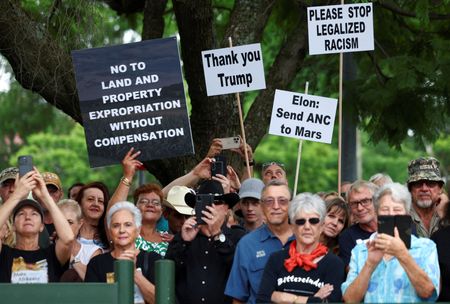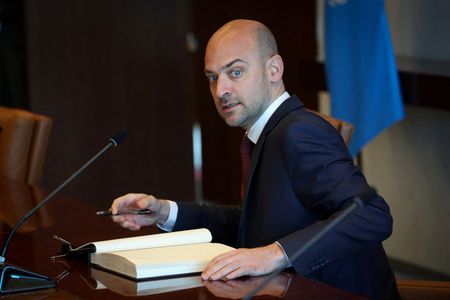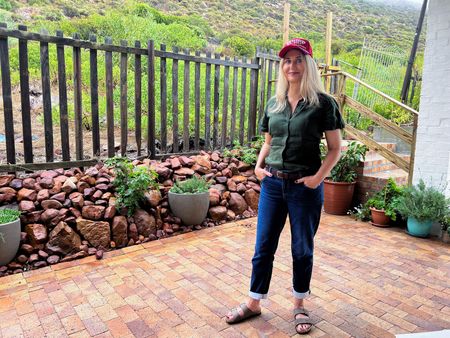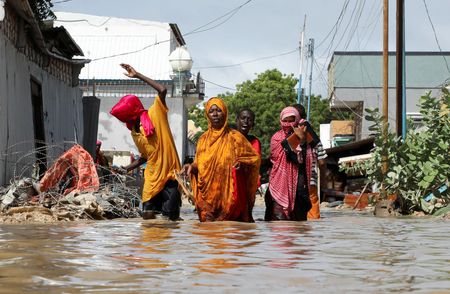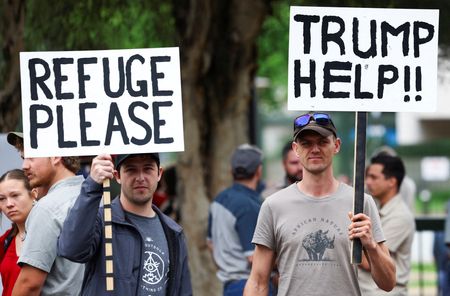By Tim Cocks, Shafiek Tassiem and Daphne Psaledakis
JOHANNESBURG/WASHINGTON (Reuters) – The Trump administration on Monday welcomed 59 white South Africans it has granted refugee status in the U.S. for being deemed victims of racial discrimination, a move that has drawn criticism from Democrats and stirred confusion in South Africa.
U.S. President Donald Trump has blocked mostly non-white refugee admissions from the rest of the world but in February offered to resettle Afrikaners, the descendants of mostly Dutch settlers, saying they faced discrimination.
Asked on Monday why white South Africans were being prioritized above the victims of famine and war elsewhere in Africa, Trump said, without providing evidence, that Afrikaners were being killed.
“It’s a genocide that’s taking place,” Trump told reporters at the White House, going further than he has previously in echoing right-wing tropes about their alleged persecution.
He was not favoring Afrikaners because they are white, Trump said, adding that their race “makes no difference to me.”
South Africa maintains there is no evidence of persecution and that claims of a “white genocide” in the country have not been backed up by evidence.
Treating white South Africans as refugees fleeing oppression has drawn alarm and ridicule from South African authorities, who say the Trump administration has waded into a domestic issue it does not understand.
A State Department official said the charter plane carrying the first 59 brought under Trump’s offer had landed at Washington Dulles airport. Earlier reports said the plane was carrying 49 Afrikaners.
People familiar with the matter said the South Africans would participate in a press conference before boarding flights to different U.S. destinations.
Some were heading to Democratic-leaning Minnesota, which has a reputation for welcoming refugees, while others planned to go to Republican-led states such as Idaho and Alabama, sources told Reuters.
U.S. Senator Jeanne Shaheen (D-NH), the most senior Democrat on the Senate Foreign Relations Committee, called the move “baffling.”
“The decision by this administration to put one group at the front of the line is clearly politically motivated and an effort to rewrite history,” she said in a statement on Monday.
‘WRONG END OF THE STICK’?
Speaking at a conference in Ivory Coast, South African President Cyril Ramaphosa said the white Afrikaners had ostensibly left because they were opposed to policies aimed at addressing racial inequality persisting since apartheid, or white minority, rule ended three decades ago.
“We think that the American government has got the wrong end of the stick here, but we’ll continue talking to them,” he said.
Trump said South Africa’s leadership was traveling to see him next week, and that he would not travel to a G20 meeting there in November unless the “situation is taken care of.”
His top diplomat, Marco Rubio, said in February he was skipping a G20 foreign minister’s meeting in South Africa, accusing the government there of “doing very bad things.”
People interviewed by Reuters in Cape Town on Monday said they bore no ill will to their departing compatriots but doubted they would find life much better in the U.S.
“I don’t believe in running away from problems, you know, we’ve got a lovely country, and we make it work,” said Robert Skeen, a 47-year-old Afrikaner selling boerewors rolls, the South African equivalent of a hot dog.
“We’re really blessed in South Africa, … with all the drama going on, it’s still one of the best countries in the world to live in.”
Since Nelson Mandela won South Africa’s first democratic elections in 1994, the once-ruling white minority has retained most of its wealth amassed since colonial times.
Whites still own three-quarters of private land and have about 20 times the wealth of the Black majority, according to international academic journal the Review of Political Economy.
Less than 10% of white South Africans are out of work, compared with more than a third of their Black counterparts.
RIGHT-WING TROPE
Yet the claim that minority white South Africans face discrimination from the Black majority has become an established trope in right-wing online chatrooms, and been echoed by Trump’s white South African-born ally Elon Musk.
Trump said on Monday the news media ignores the alleged persecution of white South Africans.
“White farmers are being brutally killed and their land is being confiscated in South Africa,” Trump said. “If it were the other way around they would talk about. That would be the only story they’d talk about.”
Those who claim white South Africans face persecution cite employment laws, violent attacks on white farmers and a new land law. Ramaphosa signed the law this year that aims to make it easier for the state to expropriate land in the public interest, which has caused concern among some white South Africans although no land has been seized.
Out of 26,000 murders in South Africa last year, 44 were linked to farming communities, according to police statistics. Crime researchers say the overwhelming majority of murder victims are Black.
Since his return to the White House in January, Trump has cut all U.S. financial assistance to South Africa, citing disapproval of its land policy and of its genocide case at the International Court of Justice against Washington’s ally Israel.
A spokesperson for the U.S. Department of Health and Human Services said on Friday it was working with the State Department to support the South Africans’ resettlement, without giving details about what kind of assistance they would receive.
The spokesperson added that more arrivals were expected in the coming months. The State Department paid for Monday’s charter flight, according to someone familiar with the matter.
(Reporting by Tim Cocks, Shafiek Tassiem and Daphne Psaledakis; additional reporting by Sfundo Parakozov, Catherine Schenck, Anait Miridzhanian, Nilutpal Timsina, Ted Hesson, Simon Lewis and Nellie Peyton; editing by Andrew Cawthorne, Don Durfee and Mark Heinrich)

